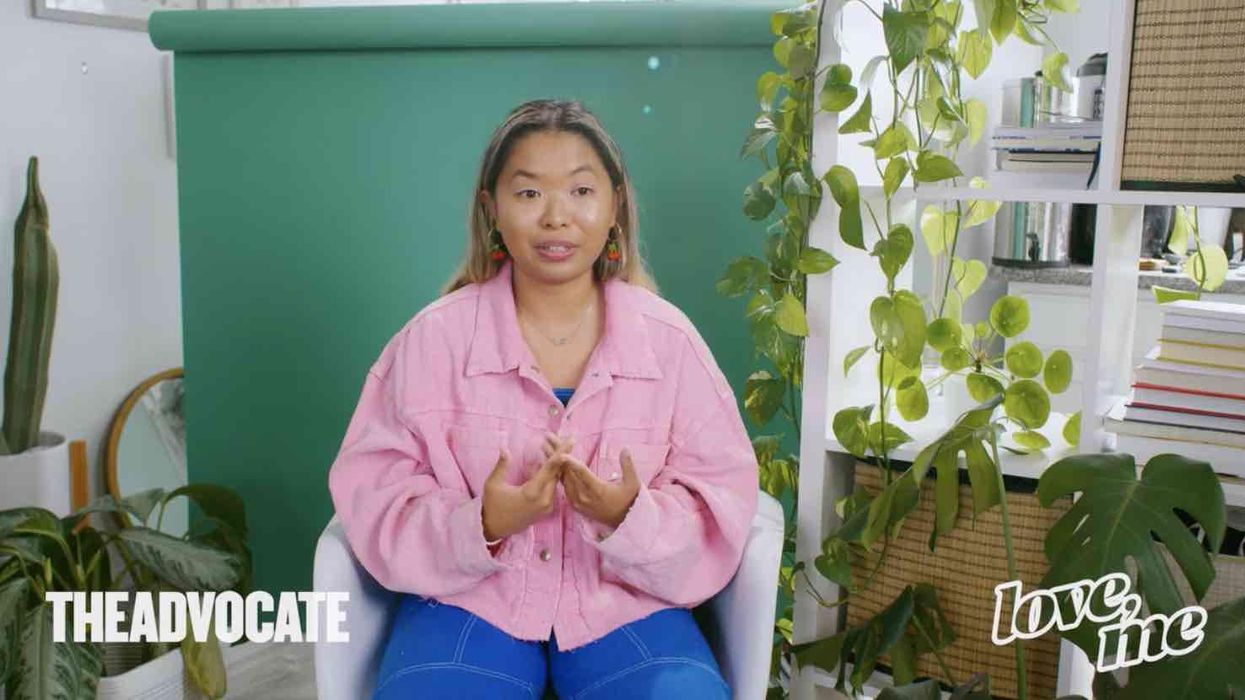Directed by Kelly Teacher for The Advocate.
There are many paths to self-love. For DeMarco Majors, one of them is a bottle of water.
The former basketball star keeps a vessel of "intention water." On it are written phrases like "I am worthy," and "love yourself," and "be kind to yourself." Each of these messages inscribed on the bottle is a benchmark he reaches throughout the day via the simple, healing act of hydration.
"I know that every time that one of those is exposed, that's what I'm ingesting," he says. "I stopped avoiding all of those different emotions and allowed myself to actually fully feel the full range of emotions I got to feel."
Majors is one of the prominent voices in Love, Me, a new editorial, video, and social media campaign from Pride Media -- The Advocate's parent company -- which shares stories of how folks are overcoming treatment-resistant depression. In addition to Majors, the series also highlights the stories of Daniel Henson, designer and founder of Leisure Lab, Dizz, a Canadian musician and member of the band rlVerse (coming to HIVPlusMag.com on May 27), and Mary Lambert, a Grammy-nominated singer and songwriter (coming to Advocate.com on June 17).
Depression is an issue that disproportionately impacts the LGBTQ+ community. According to research from the Anxiety & Depression Association of America, LGBTQ+ adults are three times more likely than straight adults to experience a mental health disorder. In fact, 40 percent of LGBTQ+ adults reported having a mental illness in the last year versus 18 percent of straight adults.
As for Majors, he blazed trails as an out gay professional basketball player on the international circuit, and he continues to bring visibility to the movement as an actor, model, and personal trainer. As a survivor of sexual assault and addiction who is HIV-positive, his activism extends to multiple arenas.
However, it is his interior work on mental health that he is most proud of. "I am my biggest achievement because I was my biggest critic," he says. "I wore myself out in depression and living in traumas, fighting life through addiction. And right here, right now, I am in love with myself. I am in love with the processes and systems that I have in place that heal me."
Now in his 40s, Majors was first diagnosed with depression when he was 20. However, the struggle had been lifelong. A native of Indiana, he "grew up not having food, or money, or clothing," and he recalled how his early struggles with depression were born out of shame tied to these insecurities. Later, as an athlete, he "trauma-bonded with coaches" over the intense work the game required, coupled with the pressure to be a breadwinner for his family.
"I learned how to survive before I learned to love," he recalls. "When you have talent in something, people see you as a commodity, to provide a paycheck."
Additionally, Majors had to contend with a culture where it was "frowned upon" for men -- particularly Black men in America -- to seek out help for depression. Now a life coach himself, he stresses how therapy was a major turning point in his mental health journey.
"My journey from therapy to coach has really what's helped me because therapy is amazing," he says. "Everyone should seek some therapy. But also seek a coach, because there's questions that coaches can ask you, and then it really digs out those areas that need to be fine-tuned."
In addition to "intention water," Majors employs meditation and prayer in his rituals for self-love, which in the long term has been "a very tumultuous journey." He employs these tools to counter a world where, as a Black man, "you have to appear perfect in society's eyes just so nobody would bother you or mess with you."
"Nowadays, I go into my mirror in the bathroom. And I say I love you ten times. Because when I go outside of the house, the world may beat me up eight, nine times. But when I come home, I still got that one 'I love you' left," he says. "And I get to actually say, I'm worth it. I deserve it. I worked for it. It's not that I needed to earn it. But I'm here and I love, love, love me."
Watch Majors recount his inspiring journey above.
If you have or are contemplating suicide, please know there is a well of support out there to help. The National Suicide Prevention Lifeline at (800) 273-8255 can be reached 24 hours a day by people of all ages and identities. If you are a trans or gender-nonconforming person considering suicide, the Trans Lifeline can be reached at (877) 565-8860. The Trevor Project is the world's largest suicide prevention and crisis intervention organization for LGBTQ+ youth (ages 24 and younger). Trained counselors at the Trevor Project Lifeline can be reached 24/7 at (866) 488-7386, by texting START to 678678, or via the TrevorChat instant messaging service at TheTrevorProject.org/Help.















Charlie Kirk DID say stoning gay people was the 'perfect law' — and these other heinous quotes
These are some of his worst comments about LGBTQ+ people made by Charlie Kirk.